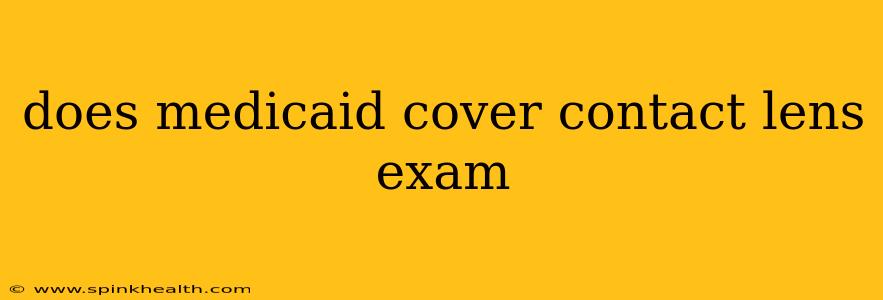Does Medicaid Cover Contact Lens Exams? Navigating the World of Vision Care and Insurance
The question, "Does Medicaid cover contact lens exams?" is a common one, sparking a mix of hope and uncertainty for those relying on this crucial public health program. The answer, unfortunately, isn't a simple yes or no. It's a journey through the intricacies of state-specific Medicaid programs and the nuances of vision care coverage. Let's embark on this journey together.
Imagine Sarah, a single mother working hard to make ends meet. Her eyesight has deteriorated, and she's considering contact lenses for a more convenient and comfortable alternative to glasses. But the cost is a significant concern. Medicaid is her primary health insurance, so she wonders, "Will Medicaid cover this?" This is where the complexities begin.
What Does Medicaid Typically Cover?
Medicaid, a joint state and federal program, offers healthcare coverage to low-income individuals and families. While the core benefits are consistent across states, the specifics, including vision care, vary significantly. Generally, Medicaid does cover basic eye exams, often referred to as comprehensive eye exams. These exams typically focus on assessing overall eye health, detecting conditions like glaucoma or cataracts, and determining the need for corrective lenses – glasses or contacts.
However, the coverage for contact lenses themselves often differs from coverage for the initial eye exam necessary for contact lens fitting. The exam specifically for contact lenses might be a separate charge from a basic eye exam.
Does Medicaid Cover Contact Lens Exams? A Deeper Dive
The key here is the distinction between a routine eye exam and a contact lens fitting exam. Many states cover the initial comprehensive eye exam necessary to determine if you need corrective lenses. However, the additional exam specifically for contact lens fitting – which is more detailed and often involves multiple appointments for fitting and follow-up adjustments – might not always be covered.
This often leaves individuals like Sarah facing unexpected out-of-pocket expenses. The additional contact lens fitting exam often includes:
- Detailed measurements: Precise measurements of your cornea and eye are crucial for proper lens fitting.
- Lens selection and fitting: This involves trying different lens types and parameters to ensure comfort and clear vision.
- Follow-up appointments: Several follow-up visits are usually necessary to fine-tune the lens fit and address any issues.
These added components often fall outside the scope of standard Medicaid vision coverage.
What About Contact Lenses Themselves?
To add another layer to the complexity, while some Medicaid programs may cover the initial contact lens exam, they rarely cover the cost of the contact lenses themselves. This means even if your exam is covered, you'll likely face additional expenses for the lenses and their replacement.
How Can I Find Out What My State Covers?
This is the crucial step. The answer to "Does Medicaid cover contact lens exams?" hinges entirely on your state's specific Medicaid program. Contact your state's Medicaid office directly. You can also:
- Check your Medicaid card: Some information about your coverage may be listed.
- Review your plan's summary of benefits: This document details your covered services.
- Contact your Medicaid provider's office: They can clarify coverage specifics.
Other Factors Affecting Coverage
- Your specific Medicaid plan: Different Medicaid managed care plans may have varying coverage levels.
- Your age and eligibility: Some states offer expanded vision coverage for specific age groups or those with specific conditions.
- The provider's participation: Ensure your eye doctor participates in your state's Medicaid program.
In Sarah's case, understanding these nuances is crucial. A phone call to her state's Medicaid office clarified that while her initial comprehensive eye exam was covered, the additional contact lens fitting exam would be her responsibility. While disappointing, this knowledge allowed her to budget accordingly and made the decision to pursue contact lenses more manageable. Her story underscores the importance of proactive research and direct communication with your state's Medicaid program to fully grasp your coverage options.

